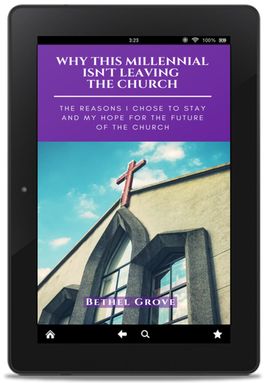|
This book is one I’ve appreciated from the first time I heard about it. I’d been a fan of Dannah’s work for quite a while when I got this book last in my college years. This book is the next level to her most popular book on sexual purity, And the Bride Wore White. It was released toward the end of the purity movement (2011) and while it falls into some of the pitfalls of the purity movement, it still does a good job of remaining biblically grounded and not shying away from difficult questions that some Christian authors used to dance around. It may be one worth checking out ~ Bethel 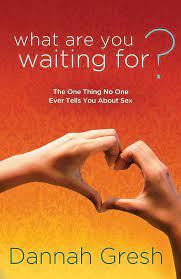 In her book What Are You Waiting For, author Dannah Gresh addresses many of the difficult questions that teen girls and young adults have about sexuality, including the most significant question: Why should we wait until we are married to have sex? This question is addressed by exploring the meaning of the word that the Old Testament uses to talk about sex – yada. This word describes a deep and intimate knowing that not only is used to a married couple having sex, but also the deep knowing and trust that God wants to have with us. Seeing sexuality through this lens helps us to see God’s plan in a new light and illustrates the problem with doing things our own way. She then dives deep into the questions that many want answers to but most are afraid to ask when it comes to what is appropriate with our sexuality and how to repent and start over if you recognize that you have fallen short of God’s plan for your sexuality. It goes deeper and is intentional about addressing many girls’ questions about sexuality while remaining grounded in Scripture. It even gives biblical guidelines for qualities you can look for in a man who honors Him. However, this book does have a few minor problems. This book was released toward the end of the purity movement and it does share a few of the same problems as many of the books that were part of that movement. In Dannah’s attempts to be honest and blunt, her wording and methods for resolution have the potential to cause guilt or shame for anyone who has struggled with sexual sin. Even the title indicates that you should be a virgin when you get married, which was one of the purity movement’s most faulty goals. As she has done in several of her books, she defines sin as “to miss the mark” and uses an archer’s target to illustrate that anything that doesn’t hit the bullseye on the target is sin. While I agree with the premise of this definition, it can come across as legalistic when you start pairing it with man-made methods of how to walk away from sin, which can lead to guilt and shame. As Christians, we have to be careful about the way that we define sin and make sure that we carefully explain God’s ability to redeem our sins for His glory so they can feel free to come into the light. Secondly, this book encourages young women to find a godly older woman to confess their sins to and hold them accountable so that they can overcome their sins. This method was a common remedy of the purity movement and is largely based on common misconceptions about confessing our sins to others as it’s encouraged in James 5:16. That verses says that we should confess to one another and pray for each other, not to confess and then rely on them to help you get out of your sin. In my opinion, seeking an accountability mentor should not be a catch-all solution to overcoming sin, especially sexual sin. Please understand that I am not saying that younger women shouldn’t learn and be taught by older godly women. Titus 2 encourages older women to teach younger women and I am not trying to discredit that. I also understand that when sin becomes any sort of addiction, a person probably will need outside help to overcome it, such as programs, support groups, or counseling. What I’m trying to communicate is that the Bible doesn’t talk about mentorship the way it is described in most Christian circles today (when a younger and older person meet for coffee once a week while the mentor does a colonoscopy on the young person’s personal life). Asking another sinner to hold you accountable in many cases diminishes the power of self-discipline (or self-control) God had already given to each one of us (2 Timothy 1:7). If you want to stop any sin, you have to be fully convinced in your own mind that it is a sin that you want to leave behind and never return. Once you have determined to walk away from your sins, then you can confess your sins to someone you trust, not to tattle tale on yourself out of guilt, but to give you other Christians in your corner praying with you through the battle. Lastly, there were some assumptions made about a few of the specific sins addressed that were clearly assumptions that could not have been backed by readers, especially in Chapter 10 (which I am avoiding mentioning by name for the sake of younger readers). Aside from these issues, this is a good book that could be a good tool for helping teen girls and young adults develop a biblically grounded view of sexuality. If this appeals to you, it’s worth checking out.  Personal Rating. This is a good resource. I especially enjoy the discussion about the word “yada” and the use of Ephesians 5 to find traits for admirable men. However, parts of the material are dated and have a few problems with making assumptions, potentially creating guilt, and blunt terminology. It’s good for adult women and older teen girls, but I would struggle with recommending it to anyone else. Here are a few books I recommend that approach
these topics in a different way: 21 Myths (Even Good) Girls Believe About Sex Sex and the Single Girl
0 Comments
I read this book when I was 16 years old. We read it as part of a girls' Bible study for my youth group and met in a meeting room at our local ice cream shop. While in some ways I have fond memories from this study, I also have some negative memories, including seeing where some of the girls that were in the study with me ended up as far as their purity journey and how some laughter happened at my expense when I was too innocent to know what some of the words meant. I do believe this book was a significant part of my personal journey because of what I learned about sexual purity, I see some weaknesses in their arguments that may have negatively impacted my views on sexual purity. So I want to take another opportunity to evaluate a popular book of the purity movement to weigh its pros and cons, so we know how to better serve the next generation when it comes to teaching them sexual purity ~ Bethel 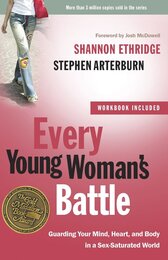 In the book, Every Young Woman’s Battle, Shannon Ethridge (and Stephen Arterburn) helps young women learn how to guard their hearts, minds, and bodies while living in a world that is saturated with unbiblical expressions of sexuality. It starts out by helping young women understand that the battle for sexual purity begins in our hearts and minds by affirming God’s design and explaining what it means to build lives of “sexual integrity” while also avoiding the pitfalls of the way the culture openly defines sexuality. It equips young women with tools that will help them guard their hearts, minds, and bodies, as well as navigate their way to adulthood and possibly future marriage all while drawing closer to God. This book doesn’t shy away from the hard-to-discuss issues, even going so far as to define most sexual terms in the footnotes and having an appendix for young women who may be struggling with same-sex attraction. The most recent editions of this book also include a workbook that can be used for group or individual study. In some ways, I appreciate how straightforward this book was in defining or explaining concepts I didn’t understand or wanted to ask out loud at that age. I also appreciated how it acknowledged that sexual purity and lust are not exclusively guy problems, so they wrote materials to address those struggles from a female point of view. Overall, this was one the best books overall that I read during the purity movement and I think there is still a lot of useful information in it. However, there are a few problems I see in their methods or reasoning. First, the idea that the reason we should avoid dressing immodestly or inappropriate flirting is to keep our brothers from stumbling is more hurtful than helpful. While avoiding immodest dress or sexual flirting is helpful for our brothers in Christ, it should not be our primary motivation. Our motivation is to obey and honor Christ in our words and actions. Modesty is simply an attitude of humility in the way that you present yourself that defers attention away from yourself and your body and instead brings attention to God or to serve others. We need to make sure that young women understand that they are only responsible for their actions unless they intentionally draw someone else into sin by their actions. We also need to remember that immodesty isn’t just a girl's problem, much in the same way as lust isn’t just a guy's problem. Guys and girls both have the same responsibilities: to avoid creating temptation while also avoiding falling into temptation. Second, this book gets pretty heavy into rule-setting, which sets up the legalistic mentality of “how far is too far” becoming the standard, all the while making those who have struggled with sexual sin feel like they are a lost cause because of the high emphasis on virginity. While a husband and wife being virgins and sexually pure on their wedding night is the most optimal way for God’s design to be enjoyed, we need to make sure that young women (and young men) understand that losing your virginity before marriage is not an unforgivable sin, nor is any other form of sexual immorality. God can redeem anything in His time for His glory, including our sexual sins, if we live in genuine repentance from those sins. We need to make sure that young people understand the significance of repentance and accepting God’s grace so they are truly able to move on when they mess up. Lastly, while I know their intentions were genuine, I am somewhat critical of the appendix for young women struggling with attraction toward the same sex. This is because I had a friend who read the information while struggling but was not helped by it. While I do believe the biblical premise is solid, you have to make sure they are committed to Christ for that logic to work. Without the saving grace of Christ to motivate them, God’s design or intentions for our sexuality will not matter to them. After they have committed to Christ, they need to have a godly sorrow that leads to repentance rather than a worldly sorrow that makes them confess their struggle out of guilt. That repentance then will lead to a spirit of self-discipline that will lead to a mental transformation that can redirect those desires. While the “confess your sins and get a mentor” method could be a part of this equation (as it could be for almost any other sin), I think that an overreliance on this method for overcoming sins can tend to diminish the crucial elements of genuine repentance, God’s redemptive grace at work, and the spirit of self-discipline that God has given each one of us to aid in the transformation. While these elements of the book are not helpful, I still think this book was one of the most useful books of the purity movement and could be a great starting point for conversations about sexual purity. I would recommend it for those 15 or older.  Pre-Teen Rating. This book does a great job of tackling the difficult aspects of sexuality. However, the terminology in the book is very blunt. While the authors took the stance that most girls probably already know most of those terms from school or the media, it could still destroy innocence for a pre-teen who doesn’t already know them. It could also go right over some pre-teens' heads. I would recommend that a girl be at least 15 or in high school before she reads it. Any parents or youth leaders should consider reviewing it themselves before using it, especially the terms defined in the footnotes.  Personal Rating. While I see this book from a more critical point of view from the first time I read it, this book did help me set my heart and mind on the right path toward purity. While there may be some more contemporary resources out there, I still think it was one of the best resources produced by the purity movement To read my review of another purity movement book, And the Bride Wore White, click here To read my review of Sex, Purity, and the Longings of a Girl's Heart, click here I had to read this book for Health class in high school. This might sound kind of strange, but it’s not when you understand that I attended a Christian school. They chose to split up the boys and the girls to talk about purity, as was common with youth groups at the time. I remember enjoying the study at the time since I was doing it the girls in my class. As I look back, I realize that there were good things I learned from this study and some things that had a negative impact on my perspective of purity and relationships. As was common of many Christian purity books and studies, there were many things that were taught during the purity movement that were not helpful or biblical grounded, while there were also other helpful that have been overshadowed by the negative impressions of this movement. As I look as this book and other books like it, I hope to identify the positive and negative elements to discern what still be useful for parents and youth leaders to teach students today ~ Bethel 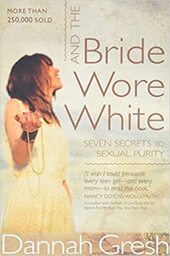 In her book And the Bride Wore White, Dannah Gresh helps teen girls break down lies that many of us believe about sexuality and reveals seven “secrets” for living a life of sexuality purity. Through understanding these lies and presenting these keys to pursuing purity, Gresh is able to offer foundation truths about the way that God designed sex. The updated edition includes additional information on understanding purity, “celebration stories” of young women successes or redeemed failures in their pursuit of purity, and some letters directly at readers with specific struggles. While this book does have some great content and biblical truth, it falls into some of the pit falls of many of the teachings of the purity movement of the 90’s/2000’s. This book does a great job of helping readers understand that sex is a beautiful gift from God that we should wait until the right time and place to use. It also does a great job at addressing lies many of us believe about sex and offering practical tips to help readers live in purity. One of my favorite parts is its emphasis on purity embracing the wise guidance of parents, grandparents, and mentors, since that is something that many young people struggle to do. Overall, it has some great insights to help young women pursue sexual purity. However, this book does have some issues. One of the “secrets” she suggest to achieve purity is to envision a godly husband, even suggesting that you should write down in a journal a description of your future husband. While I believe a young woman should figure out the qualities he wants in a future husband, the way that she suggests doing the exercise implies that you should even write down exactly how you expect him to look. Doing this exercise as a teen fueled different lies than addressed in the book. First, God often surprises us by doing things in His time and His way. It often doesn’t match up with what we picture for ourselves, especially when we get caught up in trivial details like his eye color or favorite movie. We aren’t even guaranteed a husband. We should instead be teaching young women to look at young men for their godly characteristics, like how responsible they are with money or how they treat their family. This book also tends to struggle with leaving those who have failed in their pursuit of purity feeling like unforgivable because of the high emphasis on virginity. We need to make sure that young women understand that premarital sex, other types of sexual immorality, and abortion are not unforgiveable sins that make you “damaged goods.” Instead, if you do the work of repentance in those areas, they can can become scars that God can redeem for His glory and even turn into your greatest ministry to help others. One of the reasons young women struggle with confessing sexual sin is because there is so much shame associated with other people know their struggles. They will be more likely to open up about their struggles if we help them understand that redemption is their sexual past is possible. I am grateful for what I learned from this book as a teen, and believe that even though some of the content has flaws, it could still have value for teens today, especially as a way to introduce purity to older pre-teen girls. Get your copy today. When I heard about this book, I was excited. Although I hadn’t read a book by Sara yet, I had read some endorsements from other authors I respect and appreciated her work to help teens live passionately for Christ. So I jumped at the opportunity to join the launch team for this book. In the end, I was not disappointed. This book is a great apologetics resource for teens as well as anyone who works with them. I love Sara's courage to stand for the truth but also the compassion she clearly has for those who have struggled or suffered because of the fallen world we live in. I look forward to utilizing this resource for youth ministry and looking into more resources by Sara in the future. If you work with teens, I recommend you do the same ~ Bethel When it comes to peer pressure, teens in today’s culture deal with more than any generation before them. The culture around them tries to force them to accept the most mainstream views of hot-button topics with the goal of convincing them to believe their version of the story. They are taught that truth is subjective to each person and that they can believe or do whatever they want with absolutely no consequences for themselves or those around them. Christian teens have a more difficult time than ever before trying to figure out how to live in a way that honors the Lord in a culture that tries to convince them that they should honor themselves. It makes us ask the question: is there a way to learn how to stand strong for Christ in today’s culture? 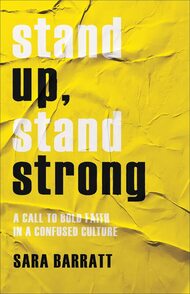 In her book Stand Up, Stand Strong, author Sara Barratt walks Christian teens through how to rethink popular issues in our culture today through a Christian worldview in hopes that they will learn how to stand strong in their convictions. After explaining the concept of a worldview and the consequences of living in a “post-truth” world, Barratt breaks down many areas where the post-truth mentality has taken hold, and explains how the mainstream perspectives hold up against a biblical worldview. With a voice of strength and courage, teens that read this book will be inspired to not only understand why they believe what they believe, but also how to defend it with grace-filled truth. Barratt speaks with both conviction and compassion on many important issues in our culture today, from sexual identity and orientation to injustice and abortion. With discussion questions and recommended readings for each topic addressed, this book is a great resource for high school students who want to build a biblical worldview or adults who want to help youth do the same. Get your copy today! * I received an advanced copy of this book from the publisher for the purpose of this review  Teen Friendly Rating. This book is an excellent resource for teens on apologetics and developing a biblical worldview. But there are some sensitive issues discussed, including specific types of sexual sin, abortion, suicide, and assisted suicide. Based on the sensitivity of these topics and some of the abstract concepts related to understanding worldviews, I would recommend this book for teens 15 or older. If your child is younger, I strongly recommend you review the book to make sure your child is mature enough to handle the content. To read my review of Dannah Gresh's True Girl Bible Study, Miriam, click here
To learn more about my book, Redeeming the Beast, click here
Although I have enjoyed and been inspired by all of the books released by Kristen and Bethany, I believe that this book is by far their best yet. In certain respects, I feel like this book was both written for me and could have been written by me with my life stories inserted into it. I don’t know if I have ever experienced that while reading any book written by other authors. The challenge of trusting God with the twists and turns of your story is a message that will resonate with every reader that chooses to take its message to heart. Being a part of the launch team and helping plan the launch of the book has just been the icing on the cake. This is a book I cannot recommend enough ~ Bethel
Change. Disappointment. Rejection. Worry. All of us have experienced these detours from the narratives we had planned for our lives. No matter how well we plan things out or how good our intentions may be, life is bound to throw us some curveballs. Knowing how to navigate these changes is hard and often painful, especially when we are dealing with major life changes. We want to believe that God is good, but it can be hard to understand His plan or feel His presence when we feel the rug ripped out from under us again and again. It makes us ask the question: How can I learn to fully trust God when life doesn’t go the way I expected? 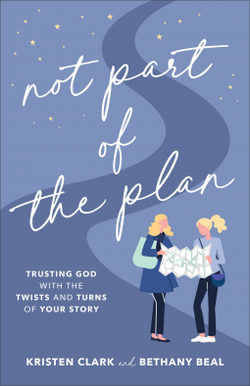
In their book Not Part of the Plan, authors Kristen Clark and Bethany Beal dive deep into helping their readers navigate the twists and turns of their story while trusting God fully. Kristen and Bethany open up in a way they never have before about their stories not going according to plan. Through Bethany’s years of unfulfilling longings for marriage and Kristen’s years of struggling with infertility, they discovered that even when life doesn’t go according to plan, God is good, ever-present, and can bring us hope and peace amid heartache and disappointment. Pairing their stories with Scriptural and practical truth, this book is designed to help young women to work through past and present detours in their stories. Each chapter includes prayers, reflection questions, and challenges to help them dive deeper. This book is honest and real in a time in history when everyone has faced challenges due to changes from a worldwide pandemic. This is a book that every young woman needs to read. Get your copy today!
*I received an advanced copy of this book from the publisher for the purpose of this review
Note: This is an affiliate link, which will allow me to earn a small commission from every sale made at no cost to you
Check out my reviews of Kristen and Bethany's other books:
Girl Defined Love Defined Sex, Purity, and the Longings of A Girl's Heart Shine Bright
To learn more about my next book, Redeeming the Beast, click here
|
Lion's Eyes Reviews is a blog dedicated to reviews of Christian books, most of which are non-fiction, but may also occasionally review movies and musicals. It will also feature the work Bethel does to help launch and promote the works of Christian authors.
The name is derived from one of Bethel's favorite books, Through the Eyes of a Lion by Levi Lusko. Through these reviews, Bethel hope to give Christians the tools they need to look at the world "through the eyes of a lion" so they can find the courage to "run toward the roar". To find the detailed archives of these reviews, you can check them out here: Books In Review Movies in Review Broadway In Review Quick Reviews To understand the rating used in these reviews, click here Categories
All
Archives
May 2024
|
|
Bethel Grove is a Christian young woman who loves to read and write, eat Reese's Peanut Butter Cup Blizzards, and disciple teen girls as a youth leader. What started as a hobby of writing book reviews and doing deep biblical studies eventually led her down the path of self-publishing and helping other Christian authors launch their books. She hopes to someday be a vocational youth minister and well-known author.
Follow AUthor Bethel Grove
|
Receive This eBook for FreeSign up for Bethel's newsletter to receive monthly updates for Abiding Grace Ministries, and you will receive a copy of this exclusive eBook for free
|



















 RSS Feed
RSS Feed

